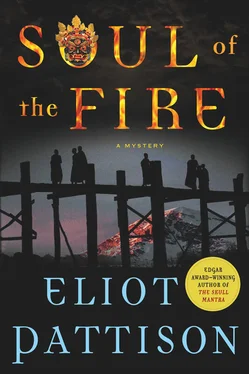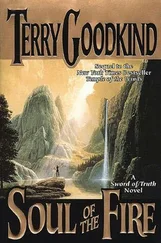Eliot Pattison - Soul of the Fire
Здесь есть возможность читать онлайн «Eliot Pattison - Soul of the Fire» весь текст электронной книги совершенно бесплатно (целиком полную версию без сокращений). В некоторых случаях можно слушать аудио, скачать через торрент в формате fb2 и присутствует краткое содержание. Год выпуска: 0101, ISBN: 0101, Издательство: St. Martin, Жанр: Полицейский детектив, на английском языке. Описание произведения, (предисловие) а так же отзывы посетителей доступны на портале библиотеки ЛибКат.
- Название:Soul of the Fire
- Автор:
- Издательство:St. Martin
- Жанр:
- Год:0101
- ISBN:9781250036476
- Рейтинг книги:4 / 5. Голосов: 1
-
Избранное:Добавить в избранное
- Отзывы:
-
Ваша оценка:
- 80
- 1
- 2
- 3
- 4
- 5
Soul of the Fire: краткое содержание, описание и аннотация
Предлагаем к чтению аннотацию, описание, краткое содержание или предисловие (зависит от того, что написал сам автор книги «Soul of the Fire»). Если вы не нашли необходимую информацию о книге — напишите в комментариях, мы постараемся отыскать её.
Soul of the Fire — читать онлайн бесплатно полную книгу (весь текст) целиком
Ниже представлен текст книги, разбитый по страницам. Система сохранения места последней прочитанной страницы, позволяет с удобством читать онлайн бесплатно книгу «Soul of the Fire», без необходимости каждый раз заново искать на чём Вы остановились. Поставьте закладку, и сможете в любой момент перейти на страницу, на которой закончили чтение.
Интервал:
Закладка:
She offered a knowing nod. “I had advanced degrees in foreign relations. I was sent for four years of reeducation in an agricultural collective. The soil of the people is now in my blood.” It was one of the proverbs taught to those who graduated from Party farms.
Shan studied the sturdy, well-fed woman, not sure if he was being tested. “And here we are,” he said. Shan had already grown accustomed to the patient, chiding frown that so frequently appeared on Choi’s countenance. It was that of a disappointed aunt.
“Here I am,” Choi replied sharply. “Responsible for a prestigious international commission.” She turned and motioned for Miss Zhu, who was nervously brushing the sleeves of her fashionable suit as if fearful of the ash. Shan did not miss the sneer on her face as she passed Kolsang. The Tibetan Commissioner stood staring solemnly at the burnt patch. His hand was moving in his jacket pocket. Kolsang, the thoroughly modern Tibetan, was secretly working a rosary.
He glanced at the two Americans, who were walking along the perimeter of red tape. Judson had enthusiastically supported Shan’s suggestion of visiting the site, but now that he was there, he seemed to have changed his mind. He was arguing with Hannah Oglesby, urging her back to the car, but the American woman ignored him. She stared at the blackened earth with a haunted expression.
“Do you have a cell phone?” he asked when Tuan returned to his side. “Take pictures of all of this,” he said when Tuan nodded, gesturing around the square. “Then of what he was looking at.”
“Looking at?”
“He had a prison full of monks and lamas above him, many with windows in their cells. He could have chosen an act of inspiration to them, committing suicide closer to their windows. He could have directed his message to one of the Tibetan villages near here. Or he could have chosen to face one of the mounds, as a tribute to all those hundreds.”
“Mounds?” Choi asked.
Shan still was not sure if he was being tested. “These are not terraces, comrade. They are mass graves for Tibetans.”
Choi visibly shuddered. Miss Zhu paled, backing away, then turned and ran back to the vehicle, where she frantically pulled the door open and leapt inside.
“Lha gyal lo,” Judson whispered at Shan’s shoulder. He returned Shan’s inquiring gaze with a sad, narrow grin. The American was not surprised by his announcement. He had known about the graves.
“He chose this spot, this isolated shelf of land, for a reason,” Shan continued. “He was looking toward the compound of officials, toward the offices at the edge of the compound. The Commission was there, with a broad window overlooking the slope.”
“Ridiculous,” Choi shot back. “The Commission’s ultimate work product will be public, but its meetings are secret.”
“In the People’s Republic, Madam Chairman, weather reports are secret. Road maps are secret. We have rendered the concept of secrecy meaningless. I would guess at least two dozen people knew where and when the Commission was meeting. All of us. The attendants. The office staff.”
As he stepped out of the square, Tuan began snapping photos. Of the boot prints. Of the blackened earth. Of Miss Lin. Of the buildings below.
Shan walked a wider circuit over the mound, pretending to study the trampled ground as he descended the mound on the far side, then paused when he was out of sight to study the small piece of metal he had retrieved from the ground. It was a lapel pin, a lacquer image of a dragon clutching a Chinese flag in its claws. He carefully rewrapped it in the foil and pushed it back into his pocket, then pressed his hands together over his heart and murmured a prayer in the direction of the prison. When he glanced back, the major was staring at him, shaking his head. Sung raised his own cell phone as if Shan needed reminding of Lokesh’s suffering.
Shan returned to the scarred earth and saw now a pile of silver ash amid the black, a tiny mound barely two inches in diameter. He turned to look for Tuan to photograph it, and when he looked back, Sung was walking inside the tape. The major’s boot precisely covered the mound, crushing it. With his next step, Sung released a black shard from the encrusted soil.
Shan paused and lifted it, touching a finger to his tongue to moisten it. It was a piece of high-grade vinyl, the kind used in China as imitation leather for dress shoes. As he laid it on his palm in the sunlight, a hand reached out to snap it away.
“Thank you, comrade,” Sung offered. He dropped it into a plastic evidence bag.
“Where is he?” Shan asked. “Where is the body?”
“Body? We have no report this man died. Commissioners must look to the Commission’s business.” As Shan stared at him, Sung’s expression hardened. The Commission was to focus on immolation suicides. If there was no death, there would be no Commission jurisdiction.
“If we are to demonstrate that the immolations are crimes,” Shan suggested, “then surely we must analyze an immolation scene. Should I write up my report in English so the foreigners can read it as well?”
Sung fixed him with a withering stare. “I will take that as an affirmation of your commitment to the Commission’s work, comrade. And you should be glad no one else is in earshot. We are trying to be tolerant of you. You were hardly an obvious candidate. Need I take more direct measures to correct your thinking? A comfortable guest apartment awaits you. But last night’s cell is also available. Or I could just have a special team visit the old man in Longtou.”
The words quieted Shan for several breaths, but then he gestured toward the square of red tape. “I was an investigator, Major. Maybe whoever wanted me on the Commission wanted an investigator more than a former prisoner. This was different, not like those in the files.”
“Different?”
“Immolations are protests. They need an audience close by to hear them shout out their last words. This was more like a copy of an immolation.”
Sung grimaced. “I don’t hear an investigator. I hear a man bitter over a lost career engaged in disruption and interference. The recommendation to have you serve may have come from a high level, but I can reach out to higher levels if necessary.”
Shan hesitated. The Commission was mired in a series of mysteries, not the least of which was the reason for him being on it. For a fleeting moment he considered pressing Sung harder, making the officer so angry he would accept his resignation. Then his gaze shifted toward the prison again. If he abandoned his position, he would lose all hope of getting Lokesh released.
“The accelerant,” he said. “It had a biting scent. More volatile than kerosene. Not lamp oil. Not diesel fuel. Have you characterized it?”
“They can roll in lard, as far as I care.”
“The Commission files always emphasize the diligence of Public Security investigation teams, leaving no stone unturned to uncover the truth. You have to at least go through the motions.”
Sung extracted another cigarette and lit it from the first. “The Commission must respect the separation of duties. The Commissioners are not investigators. Leave it to the experts, comrade.” He drew deeply on the tobacco and watched Tuan take more photos, now of Miss Lin posing arms akimbo, with the prison in the background.
“In Beijing, the Commission must have seemed an inspired idea,” Shan observed. “Fodder for Party speeches for years to come. I could write the headlines right now. The Peace Commission Strikes the Anvil of Truth. The People’s Representatives Vindicate the Motherland. The outcome was written long ago. Our issues here are just operating details. It won’t bother them in the least if a life, or a career, is destroyed in the process. We’re so far back in their dust trail, they can’t even see us.”
Читать дальшеИнтервал:
Закладка:
Похожие книги на «Soul of the Fire»
Представляем Вашему вниманию похожие книги на «Soul of the Fire» списком для выбора. Мы отобрали схожую по названию и смыслу литературу в надежде предоставить читателям больше вариантов отыскать новые, интересные, ещё непрочитанные произведения.
Обсуждение, отзывы о книге «Soul of the Fire» и просто собственные мнения читателей. Оставьте ваши комментарии, напишите, что Вы думаете о произведении, его смысле или главных героях. Укажите что конкретно понравилось, а что нет, и почему Вы так считаете.












